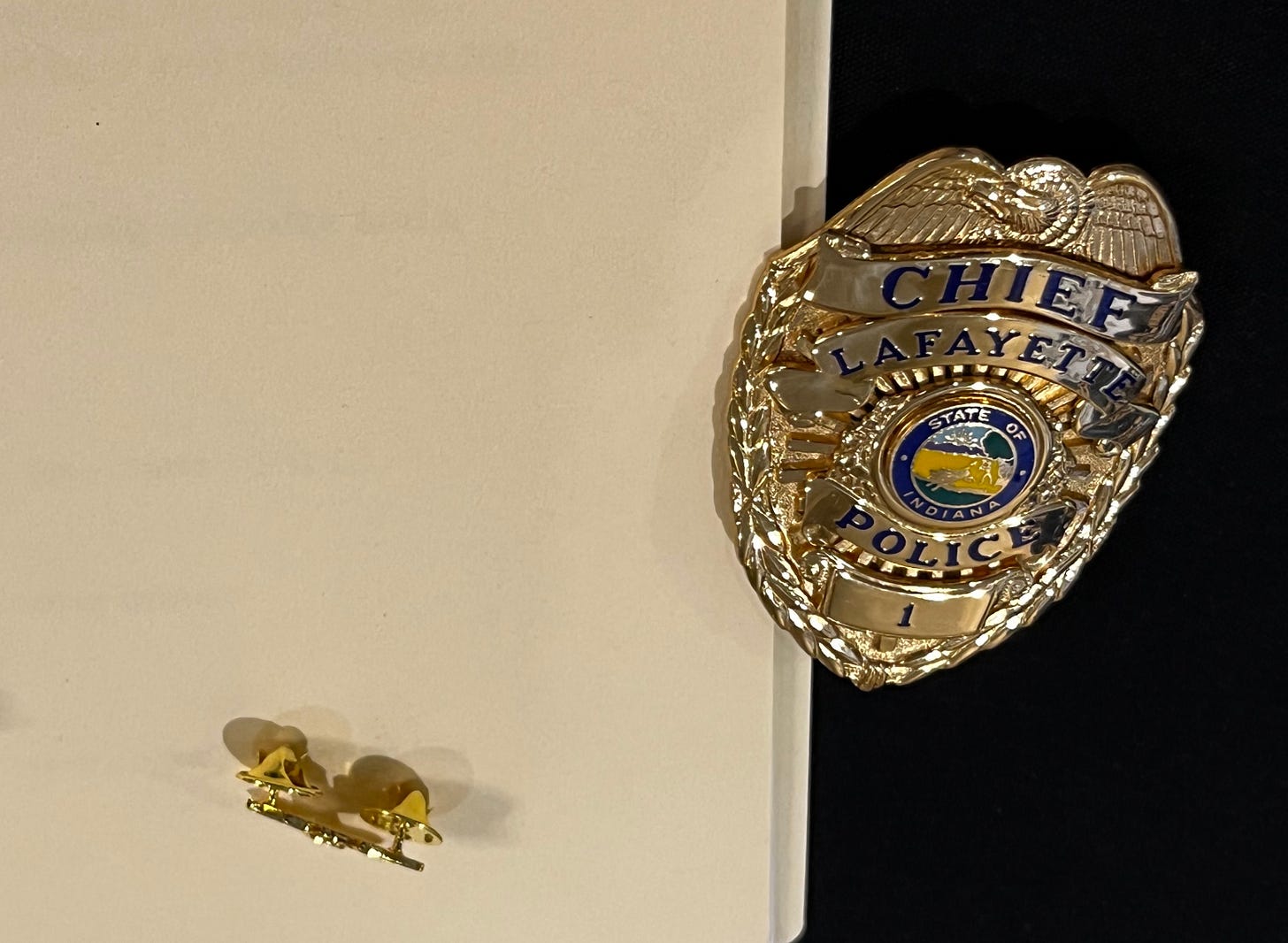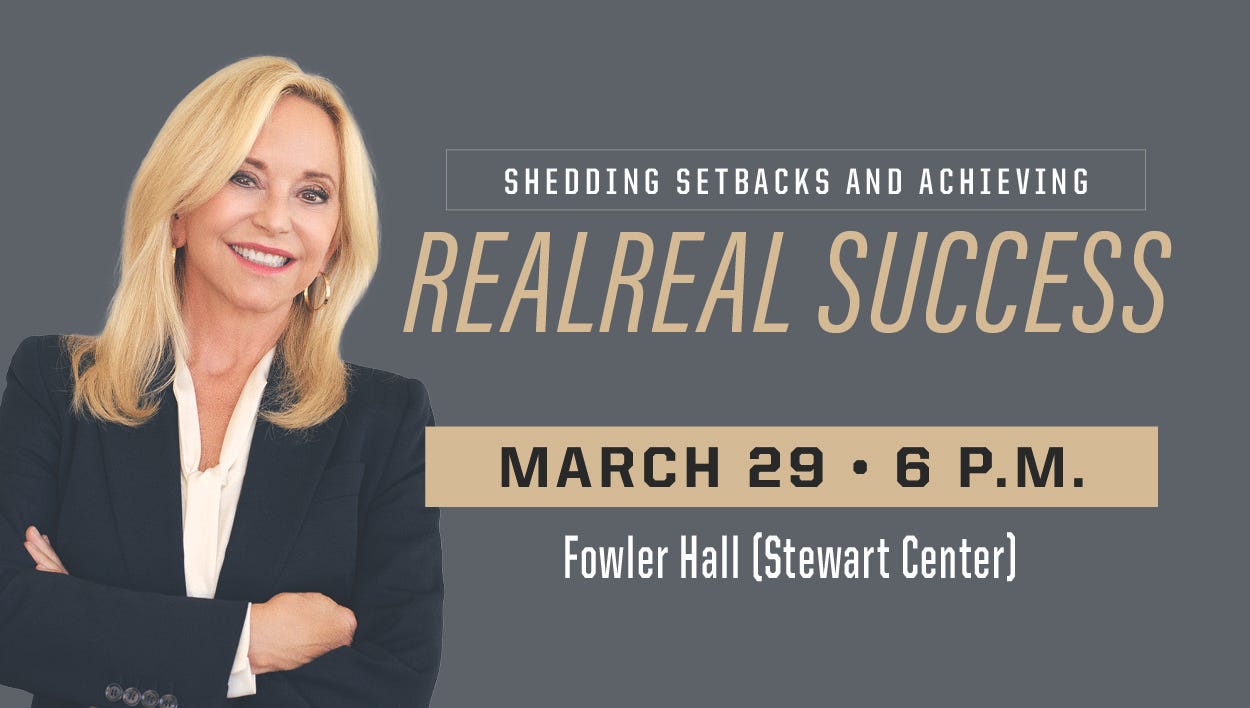New LPD chief, on the job
Plus, Tippecanoe County joins cities in opting into opioid settlement. Gov. Holcomb vetoes transgender sports bill, signs measure to relax gun permits. And ... don't disappoint his dad.
Today’s edition of the Based in Lafayette reporting project is sponsored by Purdue University’s Presidential Lecture Series, featuring Purdue President Mitch Daniels’ March 29 conversation with Purdue alumna Julie Wainwright, founder of The RealReal. For more details, scroll to the end of today’s edition.

Since November, when Mayor Tony Roswarski named Scott Galloway as the next chief of the Lafayette Police Department, the captain of the uniform patrol division has been getting up to speed for the day Pat Flannelly wound down his 9 ½ years as chief.
That was Monday.
After four months of getting acclimated, what’s first, after being sworn in and pinned as chief?
“A 360 (degree) review of things going on at the police department, to make sure what’s working, what’s not working, what adjustments need to be made,” Galloway said after a lunch-time ceremony Monday that drew roughly 200 people to the Holiday Inn Select City Centre in downtown Lafayette.
“I’m not going to be a pendulum swing, in terms of things changing,” Galloway said. “But I’ll make adjustments when I need to.”
Roswarski, who spent a career with the Lafayette Police Department, said he was confident in Galloway, who is the third chief under the mayor since he took office in 2004.
“He's a man of kindness and compassion, integrity and perseverance,” Roswarski said. “He will get the job done, because we know he now assumes the command of a position that will test him to his core. It will push him to use all of his instincts, resources, common sense and training to daily make the right decisions. And at the end of the day, as the chiefs here will tell you, he has to make them.”
Galloway joined LPD in 1998, working his way up the ranks. He has bachelor’s and master’s degrees from Purdue. He graduated from the Northwestern University School of Police Staff and Command in 2019. He takes over a department with 150 officers and in the middle of construction of a $55 million Public Safety Center across from city hall that will put the Lafayette Police Department under one roof sometime in 2023.
“He cares about the city, and cares about the people that live here and work here,” said Flannelly, who is retiring after 27 years with LPD. “Our community will embrace him, because they can trust him. Because I know I certainly trust him.”
What were Galloway’s marching orders from the mayor when he got the job?
“He’s really into the details of what goes on in the city, so minor things, quality-of-life stuff, the mayor really cares about,” Galloway said. “Then, also, big-ticket items, like violent crime, he really cares about. He has the heart of the city on his sleeve. … That’s how I plan to approach this, because Lafayette deserves all of us to give our best and to be into the details. That’s what I’ll do.”
COUNTY’S NEXT UP TO OPT-IN ON OPIOID SETTLEMENTS
Tippecanoe County commissioners voted Monday to ditch their lawsuit against opioid manufacturers and distributors, instead joining a settlement deal lead by the state.
The move follows similar moves Lafayette and West Lafayette city councils made earlier in March. With new state legislation that would give counties and cities a larger share of a $26 billion settlement with an opioid manufacturer and distributors, Tippecanoe County stands to get $2.4 million by attaching itself with the state. In an initial settlement formula used by the state, Indiana would have put 70% through the Family and Social Services Administration, 15% to the state and 15% split among units of local government, based on population. House Bill 1193, approved this session, puts the local share at 35%.
Lafayette and West Lafayette would get their own shares of that settlement money. Commissioners said it was likely that the county and the cities would work together to put that money toward ways to deal with the local costs of opioid addiction.
HOLCOMB VETOES TRANSGENDER SPORTS BILL, SIGNS GUN PERMIT BILL
Gov. Eric Holcomb saved two of the more controversial bills waiting for signatures until Monday.
Transgender sports: Holcomb vetoed House Bill 1041, which would ban transgender girls from playing school sports. In a letter sent to the General Assembly, Holcomb wrote that protecting integrity and fairness in women’s sports was “a worthy cause for sure,” but he believed “the wide-open nature of the grievance provisions” in the bill made it unclear about how it would be enforced consistently between different counties and school districts. Holcomb wrote that the IHSAA has had a policy in place for 10 years and that “not a single case of a male seeking to participate on a female team has completed the process.” (State Sen. Ron Alting, a Lafayette Republican, had made similar arguments when he voted against the bill.) Holcomb wrote that he could “find no evidence” to support claims that there is an existing problem in the state. Monday night, advocates who had lobbied that the bill was mean-spirited were praising Holcomb. Legislators were threatening to override the governor’s veto. U.S. Sen. Mike Braun and Indiana Attorney General Todd Rokita piled on with criticism of their own.
For more, here’s a version of the story from AP reporter Tom Davies, another one from Arika Herron at the Indianapolis Star and one more from the New York Times.
The gun bill: Holcomb signed a bill that would eliminate the need for a concealed-carry gun permit. House Bill 1296 had been a prime candidate for a veto, after it was revived in the closing hours of the General Assembly session amid criticism from, among others, the law enforcement community. (Pat Flannelly, before he retired Monday as Lafayette police chief, called the bill a huge mistake and testified that it would put police officers in danger. His take: “This isn’t going to end well.” Indiana State Police Superintendent Doug Carter said similar things, going off at one point at lawmakers.) Holcomb said in a statement Monday night that the law “entrusts Hoosiers who can lawfully carry a handgun to responsibly do so within our state.” Carter’s response, which came packaged with Holcomb’s comments: “I, like Gov. Holcomb, feel enormous responsibility for front-line law enforcement officers. I will work with law enforcement leaders across our state to make necessary changes to firearms enforcement as well as finding the best way to identify individuals who are not allowed to carry a firearm as defined by Indiana statute. … “We will continue to encourage citizens to apply for, and maintain, a firearms permit. A permit will assist law enforcement officers and will also allow a permit holder reciprocity with other states.”
AND FINALLY, AS CAMPAIGN SPEECHES GO …
Here’s how it works at the University Senate, the faculty-led governing body at Purdue: Each spring the senators pick a vice chair for the following academic year. That person is then in line to be the University Senate chair and the faculty’s direct connection with trustees and the administration the following year. It happened last year to Colleen Brady, a professor of agricultural sciences education and communication, who has spent this year backing up Steve Beaudoin, the 2021-22 chair. On Monday, the Senate picked between Matt Conaway, a professor with Purdue Bands and Orchestra, and bit hoarse in his speech after late night travel from Milwaukee after leading the pep band in the Boilers’ win over Texas in the NCAA Tournament; David Koltick, a physics professor and former Tippecanoe County Council member; and Brian Leung, an English professor coming off last week’s release of his latest novel, “All I Should Not Tell.”
Of note, Leung’s preamble included this: “I want to first share a personal note. My Chinese father moved from Hong Kong to San Diego in the early 1960s to study engineering, and it comes as no small point of pride for him that a little over 60 years later his son is a candidate for vice chair at Purdue University Senate. I love at last being in the position where I can't disappoint him. That's on you.”
Whether that tipped the scales, who knows? But Leung won against Koltick in a run-off vote.
Thanks to the Presidential Lecture Series for sponsoring today’s edition. Despite setbacks, Purdue alumna Julie Wainwright persisted to create the luxury resale giant The RealReal. Join the conversation alongside Purdue President Mitch Daniels in person or online at 6 p.m. March 29.
Have a story idea for upcoming editions? Send them to me: davebangert1@gmail.com. For news during the day, follow on Twitter: @davebangert.





I need to check out Leung's novel. I hear it's excellent. Also, good on Holcomb re HB 1041